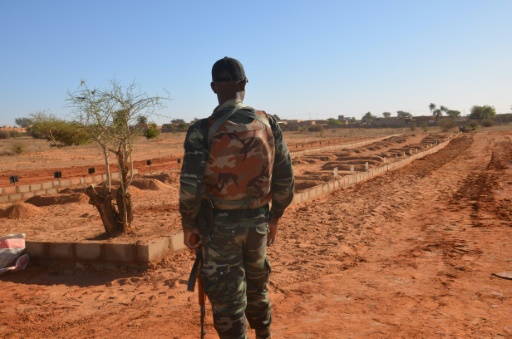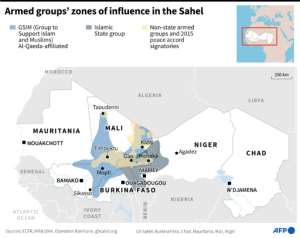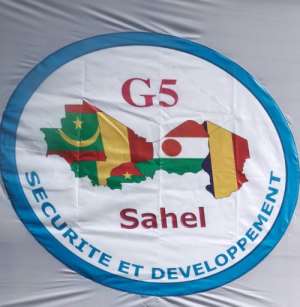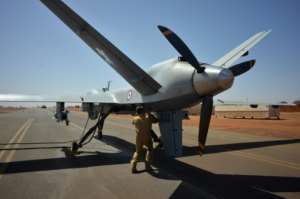
[ad_1]
Chad on Monday called for international support to help the besieged Sahel as five nations and France’s ally began a summit on the future of their anti-jihadist campaign.
The leaders of the “G5 Sahel” – Burkina Faso, Chad, Mali, Mauritania and Niger – are participating in a two-day summit in the Chadian capital N’Djamena with French President Emmanuel Macron via video conference.
Opening the meeting, Chadian President Idriss Deby Itno said the vast Sahel was grappling with “poverty, which is fertile ground for terrorism”.
He said it was time for the international community to “urgently” increase development funds, to help cut off this source of recruitment for jihadists.
The meeting comes a year after France stepped up its deployment in the Sahel, seeking to regain momentum in the brutal and long-standing battle.
But despite the vaunted military successes, the jihadists retain control of large swathes of land and attacks are relentless.
 Map showing the zones of influence of armed groups in the Sahel and regional military bases. By (AFP)
Map showing the zones of influence of armed groups in the Sahel and regional military bases. By (AFP) Just hours before the summit opened, Malian sources said two soldiers were killed by a bomb on the highway in central Mali.
These deaths bring the number of Malian, UN and French troop losses to 29 since the start of the year, according to an AFP count.
Islamist fighters from the Sahel first appeared in northern Mali in 2012, during a rebellion by ethnic Tuareg separatists that was later overtaken by the jihadists.
France intervened to rout the insurgents, but the jihadists dispersed, taking their campaign to the ethnic powder keg of central Mali, then to Burkina Faso and Niger.
Thousands of soldiers and civilians have been killed, according to the UN, while more than two million people have fled their homes.
The overwhelming toll has fueled the perception that jihadists cannot be defeated by military means alone.
 The five G5 Sahel countries have pledged to create a joint 5,000-strong anti-jihadist force – but funding, equipment, training and coordination are major obstacles. By MICHELE CATTANI (AFP / File)
The five G5 Sahel countries have pledged to create a joint 5,000-strong anti-jihadist force – but funding, equipment, training and coordination are major obstacles. By MICHELE CATTANI (AFP / File) Jean-Hervé Jezequel, Sahel director of the International Crisis Group think tank, told AFP that conventional military engagement had failed to deliver a coup de grace.
The jihadists “are able to turn their backs, bypass the system and continue,” he said.
Last year, France increased its Barkhane mission in the Sahel from 4,500 troops to 5,100 soldiers – a move that precipitated a string of apparent military successes.
French forces killed the leader of the notorious Al-Qaeda in the Islamic Maghreb (AQIM), Abdelmalek Droukdel, as well as a military leader of the Support Group for Islam and Muslims (GSIM), affiliated with Al-Qaeda.
Drawing lots for troops?
But the December and January attacks brought the French battle death toll in Mali to 50, prompting the house to question the cost and usefulness of Barkhane.
Last month, Macron opened the door to a withdrawal, suggesting that France could “adjust” its military engagement.
To lighten the load, France is hoping for more military support from its European partners through the Takuba Task Force, which assists Mali in its fight against the jihadists.
 An armed Reaper drone is checked before take off at a French base in Niger, which is part of the French anti-jihadist force Barkhane. By Daphné BENOIT (AFP)
An armed Reaper drone is checked before take off at a French base in Niger, which is part of the French anti-jihadist force Barkhane. By Daphné BENOIT (AFP) The armies of the Sahel, for their part, fail to take over.
In 2017, the five countries launched a planned joint force of 5,000, but it remains hampered by lack of funds, poor equipment and inadequate training.
Chad, which has the reputation of having the best armed forces among the five, promised a year ago to send a battalion to the flashpoint of the “three borders” where the borders of Mali, Niger and Mali converge. from Burkina. Deployment has still not taken place.
Paris also hopes that last year’s successes can strengthen political reform in Sahel states, where weak governance has fueled frustration and instability.
Source link